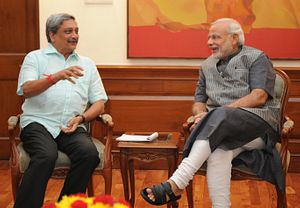A few links focused on defense and security to square off the week:
Indian Prime Minister Narendra Modi announced that he has chosen a full-time leader for India’s defense ministry after months of having both the defense and finance ministries managed by Arun Jaitley. Manohar Parrikar, the chief minister of the western Indian state of Goa, will take charge of the Indian defense ministry. Parrikar’s appointment comes at a time when India attempts to both modernize its military and develop greater indigenous weapons manufacturing capabilities. Additionally, in recent weeks, relations between India and Pakistan have declined to their worst point in years. Parrikar will be sworn in on Sunday.
Further complicating the United States’ withdrawal from Afghanistan, senior U.S. officials remarked that a delay in the departure of all American troops from Afghanistan was growing increasingly likely. The rationale for the delay is the fact that the installment of Afghanistan’s new government following this year’s presidential election took longer than anticipated, which pushed back the signing of the Bilateral Security Agreement (BSA). In order to avoid rushing the withdrawal, NATO and U.S. commanders are currently reviewing if a larger-than-anticipated troop contingent will stay on in the country into 2015 and possibly early 2016.
In a post over at the USNI blog, Dave Majumdar rounds up U.S. perspectives on China’s new Shenyang J-31 stealth fighter. According to the report, U.S. pilots and experts fear that the jet could end up matching the capabilities of the far more expensive F-35 Joint Strike Fighter. Many observers have also remarked the similarities in the J-31’s fuselage and design to the F-35, suggesting that the jet was largely developed off stolen U.S. intellectual property related to the development of the F-35. China will debut the stealth fighter next week at the Zhuhai international air show.
A senior U.S. State Department diplomat is under federal investigation as part of a counterintelligence probe, according to the Washington Post. The diplomat in question, Robin L. Raphael, has spent the greater part of her career focused on Pakistan. The details of why exactly she is being investigated remains unknown.
Over at China Power, Shannon Tiezzi has a helpful primer on the recent modest breakthrough in bilateral ties between China and Japan. The two countries agreed to move forward with relations under the rubric of a four-point consensus. The document will set the tone for any meeting between Chinese President Xi Jinping and Japanese Prime Minister Shinzo Abe at APEC 2014, should one occur.
A detailed piece in The Korea Herald highlights the domestic debate in South Korea over the deployment of a U.S. Terminal High-Altitude Area Defense (THAAD) system. Proponents of the system argue that it would deter North Korean attacks on the South, and prove a saving grace in the case of a broader war between the two neighbors. Critics, meanwhile, claim that “the deployment would turn South Korea into the U.S.’ front-line missile defense base and cause diplomatic friction with China, forcing Seoul to bear the brunt of an intensifying Sino-U.S. rivalry.”

































